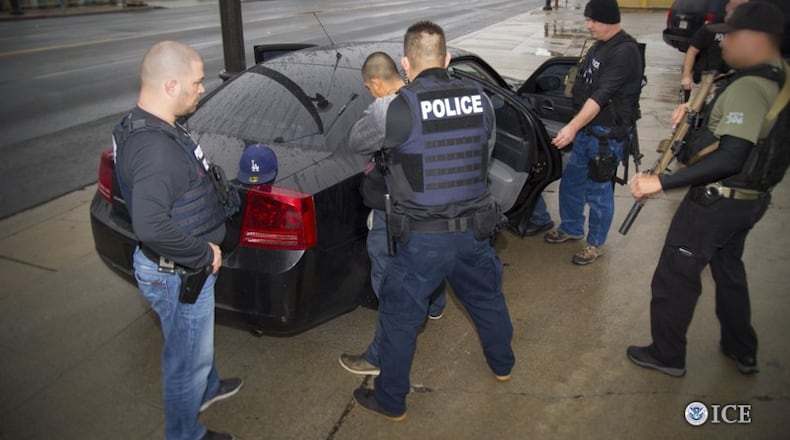The Trump administration, racing to crack down hard on illegal immigration, is carrying out sharply more arrests of people living without authorization in Georgia and the Carolinas, according to federal figures obtained by The Atlanta Journal-Constitution.
Between Jan. 20 and April 29, U.S. Immigration and Customs Enforcement made 4,246 apprehensions in its Atlanta area of operations, which includes Georgia, North Carolina and South Carolina. That represents a 75 percent increase from the same period last year, when President Barack Obama was in office and there were 2,429 arrests.
And it exceeds the nationwide 38 percent increase in ICE arrests for the same time span. Since Trump took office, 41,318 people have been arrested on civil immigration charges across the country, up from 30,028 during the same period last year.
Donald Trump made his get-tough approach to illegal immigration a central part of his presidential campaign. Soon after he moved into the White House, he made good on his promises by signing a pair of executive orders to bolster enforcement, hire 15,000 additional ICE and Border Patrol officials, and build a new wall on the southwest border.
“These statistics reflect President Trump’s commitment to enforce our immigration laws fairly and across the board,” ICE acting director Thomas Homan said in a prepared statement this week.
More than a quarter of those who were arrested this year have no criminal convictions, ICE’s figure show. In contrast, 14 percent of those arrested last year had no criminal convictions.
“A massive increase in arrests of people who have committed no crime is cause for shame, not celebration,” said Omar Jadwat, who directs the American Civil Liberties Union’s Immigrants’ Rights Project. “ICE’s number-driven approach makes communities less safe, and that is a big part of why local officials continue to refuse to become part of the mass deportation apparatus.”
ICE officials have repeatedly stressed they are conducting "targeted immigration enforcement" and not checkpoints, sweeps or raids that indiscriminately target people. At the same time, they are saying they "no longer will exempt classes or categories of removable aliens from potential enforcement."
Phil Kent, a member of Georgia’s Immigration Enforcement Review Board, hailed the Trump administration’s ramped up crackdown.
“The increase in arrests by ICE is heartening to those who seek a lower crime rate and desire a legal workforce,” he said. “The refreshing new reality under the Trump administration is that all illegal immigrants are deportable.”
ICE pointed out that it carried out larger numbers of arrests during the same period nationwide and in its Atlanta area of operations in 2013, when Obama was in office. Moreover, Obama got the derisive nickname “deporter in chief” for expelling more people than any other president in history.
Deportations — which can lag far behind arrests because of massive Immigration Court backlogs and appeals — are down nationwide 13 percent this year compared to the same period last year. Between Jan. 20 and April 29, 57,735 people were expelled.
Georgia, meanwhile, is on the front lines of the latest crackdown. During a nationwide operation in February, ICE arrested 87 people in Georgia. And last month, as many as 10 Somali nationals were arrested in Clarkston, Stone Mountain and Gwinnett County, according to the Somali American Community Center. Advocates worry they will be deported to their native country, which is struggling amid a deadly drought, deprivation and violence.
Prompted partly by the arrests of the Somalis, Clarkston City Council members voted unanimously this month to limit their tiny DeKalb County community's cooperation with federal deportation officers.
“Deporting our Somali friends and neighbors back to their home country where thousands are dying is a potential death sentence,” Clarkston Mayor Ted Terry said.
About the Author
Keep Reading
The Latest
Featured



